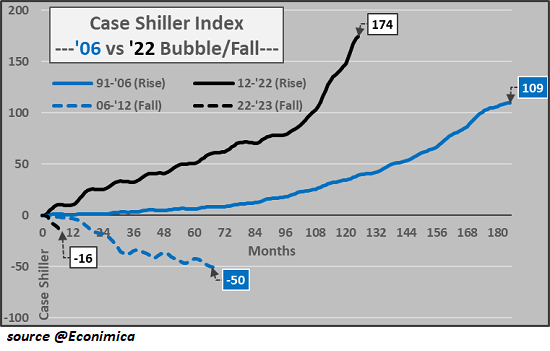Let’s review how to select a town that the rich won’t ruin via gentrification / swarming in en masse and driving out locals who have to work for a living.
Yesterday I discussed how those enriched by two decades of Federal Reserve-inflated bubbles make housing unaffordable for the bottom 90% by gentrifying previously affordable neighborhoods and towns. Once the truly wealthy have snapped up all the most desirable properties in the most desirable enclaves, the merely millionaires start snapping up nearby properties, fueling a bidding war that soon pushes valuations out of reach of the working populace.
As I discussed in
STVR/Airbnb Has Destroyed America’s Resort Towns (8/30/23), the net result is the workforce of the gentrified town can no longer afford to buy or rent shelter near their work place. This forces them to commute long distances or give up and move away, leaving the town short of people to actually do the work of keeping the town operating.
Let’s review how to select a town that the rich won’t ruin via gentrification / swarming in en masse and driving out locals who have to work for a living. Let’s start by dividing the wealthy seeking a nice place to live where we can park some of our excess capital into four very different classes:
1. The most desirable class of wealthy residents is old money, families with deep roots in the town who quietly fund needed improvements and services with their wealth and who are protective of what makes the town a nice place to live. They have the clout to protect the town from the entitled vultures seeking to make a quick buck off gentrification and low-quality development.
Recent arrivals (within the past 20 years) can qualify if they follow the same script of quietly donating large sums to local needs and quietly working to keep out the vultures of gentrification. This class of wealth isn’t interested in scooping up all the land for their own mini-empire; they own enough for their own comfort but are not trying to own the whole area like the wealthiest, greediest vultures.
2. The second most desirable class is the entrepreneurial wealthy, those who earned their capital via hard work, thrift and building enterprises that add value–in other words, the opposite of the entitled wealthy whose money is the unearned spawn of Fed-inflated bubbles.
The entrepreneurial wealthy are less likely to be toxically entitled, more likely to be down to earth and more likely to invest for the long-term in local businesses that provide employment and services.
3. The least desirable class is the entitled bubble-wealthy who are cluelessly self-absorbed and demanding. They expect locals to be uncomplaining servants / serfs who will do whatever the entitled wealthy want done for low wages. They arrive with bloated self-importance and a toxic sense of entitlement, as if everything they want should be available to them wherever they are on the planet. They are ignorant of local history and culture and have little interest in fitting in and zero interest in contributing any real work to the community.
4. The most destructive class is the vulture-developer class who want to swoop in, build a bunch of low-quality strip malls and shoddy houses for the entitled bubble-wealthy that overburden the town’s limited infrastructure of roads, water service, etc., ruining it for residents new and established alike.
Somewhat tongue in cheek, here is a list of attributes you want to look for to avoid, as they’re magnets for the entitled bubble-wealthy and the the vulture-developer class:
The click-bait articles touting “the 25 best towns in America” serve one useful function: cross those towns off your list, as they’ve already been ruined by the influx of entitled, self-absorbed outsiders.
A more valuable use of time is to research what the entitled wealthy are looking for, and avoid those towns and small cities that check all the boxes the wealthy consider “must-haves.”
This includes a nearby highly rated hospital, as the wealthy are anxious to access the same high-quality care they’re entitled to, should anything untoward happen to their precious bodily fluids.
High-end healthy cuisine is also a must. If haute cuisine isn’t available, there must be tony cafes and bistros offering fish tacos, fresh fusion-inspired sandwiches made with artisan bread and similar light fare, vegan and vegetarian options and an acceptable selection of wines, craft beers and other beverages.
The town must have a decent bakery and butcher, and a farmer’s market, of course, as the wealthy are too busy day-trading, logging onto conference calls or jetting off for their next vacation-business meeting to actually grow any real food themselves.
A handful of cutsy shops for browsing is also essential, as is some live entertainment venue.
A cafe that grinds its own coffee and stocks luxury beans for grinding at home is also a must, a place expensive enough that locals will stay away, so the wealthy newcomers can gather to complain about the scarcity of quality “help” locally, as they’re accustomed to hiring undocumented immigrants for scandalously low rates of pay.
The police or sheriff’s department must be responsive to their calls, of course, as they’re entitled to special consideration due to the taxes they pay (as if locals don’t pay taxes, too…).
An absolute must is a nearby major airport, as the wealthy are always jetting around and it’s terribly inconvenient to have to drive a tediously long way to a commercial airport.
Competent tradespeople, mechanics and techies are high on the priority list, as it’s extremely annoying not to have someone who can fix the pool pump in summer, trim the hedges just so, maintain the fast Internet connection and do all that bothersome work keeping the short-term vacation rentals spiffy.
Fast Internet service is of course a must; spotty Starlink service will nix a locale immediately.
If you want to find some place the entitled wealthy are unlikely to ruin because they won’t move there–or if you want to get there before the hordes of entitled but-not-quite-rich-enough-to-buy-an-elite-enclave arrive–find a town that lacks some or all of these essentials, a place the wealthy will turn up their noses to, a town with the few things you care about but not enough to spark the interest of the entitled wealthy.
A town with minimal tourism is a good start, as the wealthy are drawn to unspoiled rural idylls that they can “improve” (i.e. destroy) with their entitled demands for a neofeudal arrangement of locals serving their whims without complaint for low pay.



My new book is now available at a 10% discount ($8.95 ebook, $18 print):
Self-Reliance in the 21st Century.
Read the first chapter for free (PDF)
Read excerpts of all three chapters
Podcast with Richard Bonugli: Self Reliance in the 21st Century (43 min)
My recent books:
The Asian Heroine Who Seduced Me
(Novel) print $10.95,
Kindle $6.95
Read an excerpt for free (PDF)
When You Can’t Go On: Burnout, Reckoning and Renewal
$18 print, $8.95 Kindle ebook;
audiobook
Read the first section for free (PDF)
Global Crisis, National Renewal: A (Revolutionary) Grand Strategy for the United States
(Kindle $9.95, print $24, audiobook)
Read Chapter One for free (PDF).
A Hacker’s Teleology: Sharing the Wealth of Our Shrinking Planet
(Kindle $8.95, print $20,
audiobook $17.46)
Read the first section for free (PDF).
Will You Be Richer or Poorer?: Profit, Power, and AI in a Traumatized World
(Kindle $5, print $10, audiobook)
Read the first section for free (PDF).
The Adventures of the Consulting Philosopher: The Disappearance of Drake (Novel)
$4.95 Kindle, $10.95 print);
read the first chapters
for free (PDF)
Money and Work Unchained $6.95 Kindle, $15 print)
Read the first section for free
Become
a $1/month patron of my work via patreon.com.
Subscribe to my Substack for free
NOTE: Contributions/subscriptions are acknowledged in the order received. Your name and email
remain confidential and will not be given to any other individual, company or agency.
| Thank you, Matt G. ($50), for your magnificently generous Substack subscription to this site — I am greatly honored by your support and readership. |
Thank you, Dave H. ($50), for your superbly generous Substack subscription to this site — I am greatly honored by your support and readership. |
| Thank you, Greg L. ($50), for your splendidly generous Substack subscription to this site — I am greatly honored by your support and readership. |
Thank you, Michael J. ($50), for your marvelously generous Substack subscription to this site — I am greatly honored by your support and readership. |

